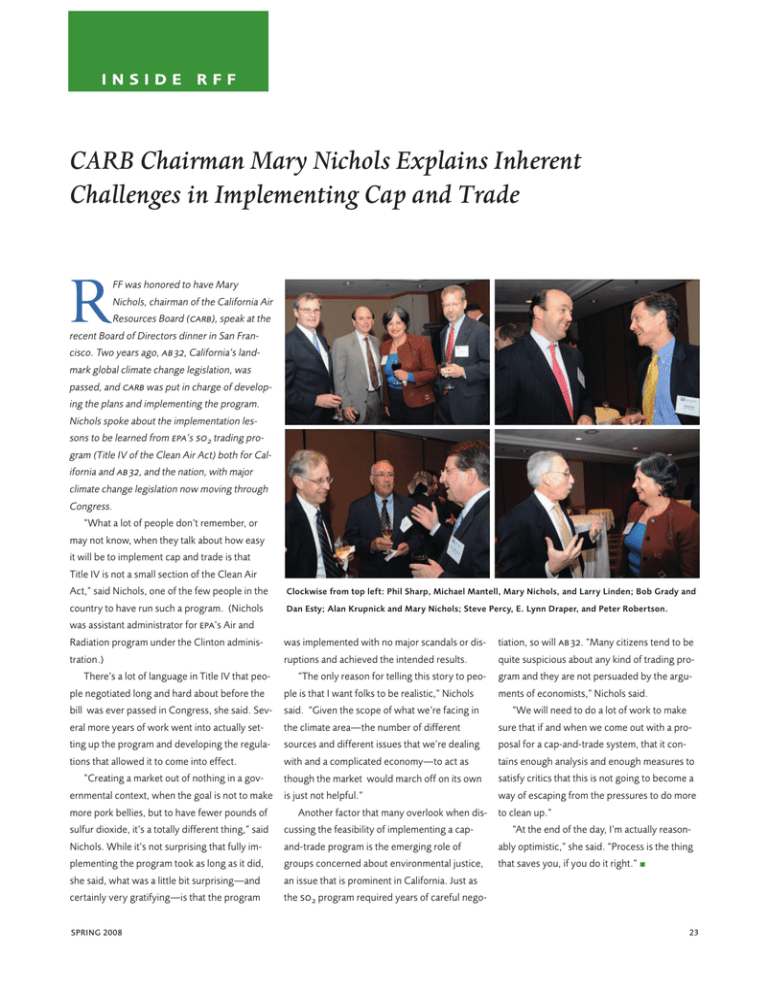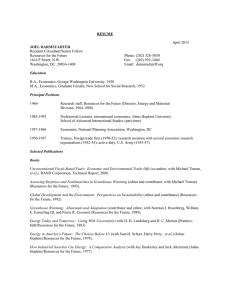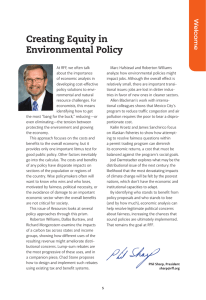R CARB Chairman Mary Nichols Explains Inherent
advertisement

inside rff CARB Chairman Mary Nichols Explains Inherent Challenges in Implementing Cap and Trade R FF was honored to have Mary Nichols, chairman of the California Air Resources Board (carb), speak at the recent Board of Directors dinner in San Francisco. Two years ago, ab 32, California’s landmark global climate change legislation, was passed, and carb was put in charge of develop- ing the plans and implementing the program. Nichols spoke about the implementation lessons to be learned from epa’s so2 trading program (Title IV of the Clean Air Act) both for California and ab 32, and the nation, with major climate change legislation now moving through Congress. “What a lot of people don’t remember, or may not know, when they talk about how easy it will be to implement cap and trade is that Title IV is not a small section of the Clean Air Act,” said Nichols, one of the few people in the country to have run such a program. (Nichols was assistant administrator for epa’s Air and Radiation program under the Clinton administration.) There’s a lot of language in Title IV that people negotiated long and hard about before the bill was ever passed in Congress, she said. Several more years of work went into actually setting up the program and developing the regulations that allowed it to come into effect. ”Creating a market out of nothing in a governmental context, when the goal is not to make more pork bellies, but to have fewer pounds of sulfur dioxide, it’s a totally different thing,” said Nichols. While it’s not surprising that fully implementing the program took as long as it did, she said, what was a little bit surprising—and certainly very gratifying—is that the program SPRING 2008 Clockwise from top left: Phil Sharp, Michael Mantell, Mary Nichols, and Larry Linden; Bob Grady and Dan Esty; Alan Krupnick and Mary Nichols; Steve Percy, E. Lynn Draper, and Peter Robertson. was implemented with no major scandals or disruptions and achieved the intended results. “The only reason for telling this story to people is that I want folks to be realistic,” Nichols said. “Given the scope of what we’re facing in the climate area—the number of different sources and different issues that we’re dealing with and a complicated economy—to act as though the market would march off on its own is just not helpful.” Another factor that many overlook when discussing the feasibility of implementing a capand-trade program is the emerging role of groups concerned about environmental justice, an issue that is prominent in California. Just as the so2 program required years of careful nego- tiation, so will ab 32. “Many citizens tend to be quite suspicious about any kind of trading program and they are not persuaded by the arguments of economists,” Nichols said. “We will need to do a lot of work to make sure that if and when we come out with a proposal for a cap-and-trade system, that it contains enough analysis and enough measures to satisfy critics that this is not going to become a way of escaping from the pressures to do more to clean up.” “At the end of the day, I’m actually reasonably optimistic,” she said. “Process is the thing that saves you, if you do it right.” ∫ 23 nomics and engineering. Having completed Meet RFF’s Newest Scholar H arrison Fell joined rff last September as a fellow in its Energy and Natural Resources Division. His re- search focuses on marine resource issues, such as rights-based fishery management, a system in which fishing rights are given out at the individual level rather than having an entire fish stock as a common-pool resource for all fishers. His enthusiasm for environmental issues his Ph.D. in economics at the University of Washington, Fell found marine resource is- management on the fishing industry, a topic he also addressed in his Ph.D. dissertation. At rff, he will continue research on the ability of fish processors to react to markets and the bargaining power of fishermen. Created markets in general—those which sues a natural fit. “At the heart of many environmental and natural resource economics problems is the issue of property rights, and this is certainly true for marine resource economics,” says Fell. “What is particularly interesting is that there are currently many natural experiments to study as fishery management in some areas moves from commonproperty systems to some form of rights-based management.” harrison fell He received a fellowship from Sea Grant, in conjunction with the Na- tional Oceanic and Atmospheric Administrasparked during his time at the Colorado School tion (noaa), and worked to improve underof Mines, where he received a B.S. in both eco- standing of the impacts of rights-based wouldn’t otherwise exist because of a lack of property rights, but do because of government intervention— are also of interest to Fell. He notes that “knowledge gained studying the property-rights issues surrounding fisheries can be translated into other areas of environmental economics.” Prior to joining rff, he worked as a contractor for the Pacific States Marine Fisheries Council and as a research assistant for the Alaska Fisheries Science Center, part of the National Marine Fisheries Service. ∫ RFF Board Member and University Fellow Leads New AERE Journal I n April 2007, the Association of Environmental and Resource Economists (aere) launched the Review of Environmental Economics and Policy (reep), the organization’s official accessible journal, complimenting its official technical journal, the Journal of Environmental Economics and Management (jeem). rff Board Member and University Fellow Robert Stavins serves as the editor, overseeing the solicitation and editing of content, which is focused on the broader lessons to be learned from environmental and resource economics. Aiming to fill the gap between traditional academic journals and the general interest press, the inaugural issue included such titles as “A Celebration of Environmental and Resource Economics,” “To Tax or Not to Tax: 24 Alternative Approaches to Slowing Global Warming,” and a symposium of articles on the European Union’s Emissions Trading Scheme. The journal also includes regular features like “Policy Monitor,” “Reflections on the Literature,” and “Announcements,” which provides timely notices of calls for papers, conferences and workshops, and other relevant updates. aere was established in 1979 as a means of exchanging ideas, stimulating research, and promoting graduate training in the relatively new field of resource and environmental economics. Researchers at rff were instrumental in the creation of aere and leadership at rff agreed to provide an organizational home to the new association. ∫ “COMMON TRAGEDIES” RECEIVES NOD “Common Tragedies,” (http://commontragedies.wordpress.com/) the blog started in September 2007 by rff Research Assistants Sarah Darley, Daniel Hall, Evan Herrnstadt, Erica Myers, and Richard Sweeney, was noted in February by the Times Online as one of the “Top 50 Eco Blogs” (http://timesonline.typepad.com/environment/2008/02/thetop-50-eco.html) on the internet. The group posts regularly on a range of topics relating to environmental and energy economics and policy. RESOURCES






